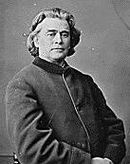Samuel Fenton Cary
| Samuel Fenton Cary | |
|---|---|
 |
|
| Member of the U.S. House of Representatives from Ohio's 2nd district |
|
|
In office November 21, 1867 – March 3, 1869 |
|
| Preceded by | Rutherford B. Hayes |
| Succeeded by | Job E. Stevenson |
| Personal details | |
| Born |
February 18, 1814 Cincinnati, Ohio, U.S. |
| Died | September 29, 1900 (aged 86) College Hill, Cincinnati, Ohio, U.S. |
| Resting place | Spring Grove Cemetery |
| Political party | Independent Republican, Greenback |
| Spouse(s) | Maria Louisa Allen Cary 1836 Lida Stillwell Cary 1849 |
| Children | six |
| Alma mater |
Miami University Cincinnati Law School |
| Profession | Politician, lawyer, farmer |
Samuel Fenton Cary (February 18, 1814 – September 29, 1900) was a congressman and significant temperance movement leader in the 19th century. Cary became well-known nationally as a prohibitionist author and lecturer.
Cary was born on February 18, 1814 in Cincinnati, Ohio. He graduated from Miami University in 1835 and at the Cincinnati Law School in 1837 being admitted to the bar the same year, practicing law out of his in office in Cincinnati. He was elected a judge in the Ohio State Supreme Court, but decided to pass the job up. Instead, he got the post of Paymaster General for the state of Ohio during the terms of Governors Mordecai Bartley and William Bebb.
He stopped working in law in 1845 to become a farmer and also to devote himself to temperance and anti-slavery groups. He gave lectures and wrote books on prohibition and slavery matters. He was a delegate to the Republican National Convention in 1864 supporting Abraham Lincoln for a second term who initially had won. Cary then became Collector of Internal Revenue for Ohio's first district in 1865.
In 1867, Cary was elected to the 40th United States Congress as an Independent Republican to represent Ohio's second district, taking seat November 21, 1867. This was caused by the resignation of future United States President Rutherford B. Hayes who had just been elected Governor of Ohio. There, he became the chairman of the Committee on Education and Labor. Cary had also been the only Republican to vote against the impeachment of President Andrew Johnson. He lost the election to the Forty-first Congress in 1868 to Job E. Stevenson.
...
Wikipedia
